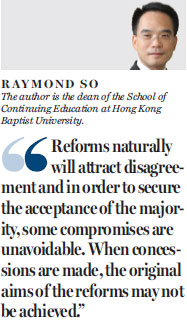Revamping our public healthcare system is a daunting job
Updated: 2016-12-08 07:35
By Raymond So(HK Edition)
|
|||||||
A few things about Hong Kong's healthcare system recently have caught my attention. Looking at these issues together, I have formed a not-so-rosy picture about the future of our medical system. Hong Kong's healthcare system reform has reached a critical point. If we continue to adopt a stay-put approach, we are not just losing the opportunity for fixing the system; it will also put an unbearable burden on our next generation.
It is a well-known fact that Hong Kong has a growing aging population. However, many people do not know that the severity of Hong Kong's aging problem is only second to that of Japan in Asia. An aging population is accompanied by rising healthcare demands. However, Hong Kong's healthcare system is already well beyond its capacity. Take the nurse-to-bed ratio, for example. The local standard is set at 1:6; however, the actual ratio has nearly hit 1:12. We have also heard many stories about the long working hours of house doctors. A non-stop shift of 36 hours is considered the norm rather than the exception.

It is unfair to say that the government does not know the problem. Indeed, there are many healthcare proposals put forward by the government. For example, there are proposals on the implementation of a voluntary medical insurance system, the revision of Accident and Emergency (A&E) charges by public hospitals and reform of the Medical Council. These are some of the proposed ideas for reforming our medical system. Hence, we should put these pieces together to form a bigger picture about reforming our medical system.
The idea of introducing a voluntary medical insurance scheme aims to encourage the use of private healthcare services and therefore help relieve the pressure of increasing demand for public healthcare. The adjustment of A&E charges aims to reduce the abuse of such services so that real emergency cases can be handled in a speedy way. The reform of the Medical Council aims to address the rights of patients. Nevertheless, reforms are often unwelcome because they change existing paradigms. Reforms naturally will attract disagreement and in order to secure the acceptance of the majority, some compromises are unavoidable. When concessions are made, the original aims of the reforms may not be achieved.
For example, under the proposed voluntary medical insurance scheme the government has made it clear that it will not push through two controversial requirements, namely the mandatory acceptance by insurance companies of clients at high risk and a cap on the insurance premiums charged. These two controversial requirements would have ensured that no one would be denied to health insurance. Nevertheless, it will be considered unwise if the government insists on these two requirements. To the insurance companies, if they are required to accept the high-risk clients and a cap on the insurance premium they receive, they will find it difficult to be in this business as their premium incomes may not be enough to offset the claims. Further, the voluntary medical insurance scheme needs an injection of funds by the government, and approval by the Legislative Council's Finance Committee is needed. Given today's political reality and the controversial nature of the voluntary medical insurance scheme, the withdrawal of these two controversial requirements makes senses. This is the strategy of doing the easy parts first.
Initially, there was a proposal to increase A&E charges from HK$100 to HK$220. The Hospital Authority says that the idea is to reduce the abuse of A&E services. However, the authority recently has changed its tone. Instead of defending the proposed $220 charge, the Hospital Authority has said that it will consider the matter at its open meeting. Certainly any increase in A&E charges will not be welcomed by the community. It could be the government's strategy to manage expectations such that a higher charge is first suggested, then a revised lower charge is tabled so it will be easier to get people's acceptance. Nevertheless, it shows that there are always discounts on the original targets of any proposed reform. Likewise, reform of the Medical Council is not likely to make any real progress in the near future.
These issues seem to be independent. But if we tie them together, it shows that Hong Kong's public medical service system is indeed facing high pressure. Given the current political reality, it is unlikely that the government can make substantial breakthroughs in reforming the system. Continuing to do things piecemeal may be more likely.
(HK Edition 12/08/2016 page7)